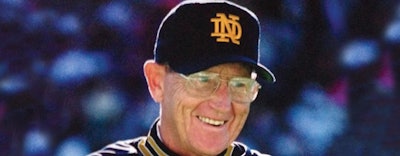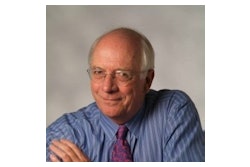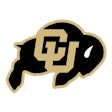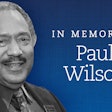
Lou Holtz is an American football legend. He coached college football for 33 seasons — William and Mary (1969–1971), North Carolina State (1972–1975), Arkansas (1977–1983), Minnesota (1984–1985), Notre Dame (1986–1996), South Carolina (1999–2004) — racking up 234 victories along the way, which ranks 28th among the 91 college coaches with 200 or more wins. AB executive editor Andy Berg caught up with Holtz ahead of his keynote engagement at AB Show 2019 in Orlando to talk about the future of football and the impact the game has had on the storied coach's life.
You've played football at the college level, coached football at both the college and pro levels, as well as commentated for national outlets. What do you love about the game?
I think it's the camaraderie. It's the togetherness. It's the hard work. The only friends you have in this world when things don't go well are those you eat with, sleep with, bleed with, pray with and cry with. And what that comes down to is basically your teammates and your family. Much like the military, you have to count on one another. It's not one individual. It's a team sport. You learn about sacrifice. You learn about personal accountability. You're responsible. You have a goal and your goal is to succeed. And everyone has a role, and you have to assume that role to the best of your ability, or you jeopardize the chances of the others to succeed. If you want to fail, you have the right to fail, but you do not have the right to cause other people to fail. It creates relationships that last forever. Matter of fact, last night I called a former teammate of mine at Kent State, who is suffering from cancer, and even after all these years you still reminisce about old times together.
Are you optimistic about the future of the game given the dip in participation numbers at the youth level and some of the safety concerns that have come to light?
The safety concerns are because people use their head as a weapon. When I started playing, you didn't even have a face mask, and you never hit with your head. Now they use it as a weapon. Why don't they have head injuries in rugby? Rugby's the same as football and just as physical, but they don't have a helmet, and because of that, they don't use their head. I think there's always an innate desire of a young man of a certain age to just want to have contact. They wrestle, they run, they jump — it's just part of it. When football is coached the right way, I've seen it change so many people's lives.
You can listen to this conversation on The Athletic Business Podcast! Check it out here.
At the college level, do you think the NCAA is going to have to rethink its amateurism policies?
I think it's a Pandora's box. I've always felt that one of the reasons that so many people today are proclaiming an athlete should receive money is because of the amount of money coaches make. My average salary for my 11 years at Notre Dame was $115,000. Now somebody makes $6 million or $7 million, and the athletes are saying, "I should be paid, too." I've always been against an athlete being paid to play in college. In college, student-athletes get the opportunity to go to school on a scholarship, leave there with an education, hopefully, but they don't leave there with a $150,000 debt to pay off. You have the finest facilities, the finest food, the finest video equipment, the finest weight workout equipment. You have to remember that all that money that comes in from football pays for the non-revenue sports. If you're going to pay an athlete, does he get workman's compensation if he's injured? I just think if you want to work, go to work at Walmart or McDonalds or something like that. But if you go to college, you get an education, and that's what it's for. As far as making money off your talent and ability, that's something that's going to happen down the road, but I do understand that if a school's making money off an individual's pictures and things like that — maybe they should stop the universities from doing that.
As the game evolves, so to do the facilities. What are your impressions of the new TCF Bank Stadium at Minnesota and the renovations recently completed at Notre Dame Stadium, two places where you coached?
I haven't been in the new stadium at Minnesota, but I think it's great because it's on campus. To have a stadium on campus is always a great asset. The stadium at Notre Dame was expanded because of the demand. I remember the board of trustees asked what my thoughts were at a meeting on stadium expansion. I said if you're going to expand the stadium just so more people can watch a game, and more revenue, that's not necessarily the proper reason. When we talk about a Notre Dame experience on the weekend, we're not talking just about the game. What we're talking about is the luncheon on Friday and the pep rally the night before, the band playing on the administration steps on Saturday morning and marching into the stadium. It's a shame that people who graduated from Notre Dame can't take their family and friends or business associates to experience Notre Dame. So I think the expansion was done — even though we had the NBC contract — just so we could offer that full Notre Dame experience to more people.
Do you have a favorite football memory, either as a player or a coach?
You don't have a favorite, but you have thousands of them. Every time I talk to an athlete there are different experiences that stand out in my mind. You mention an athlete, and I can tell you the memories I have of them. There's not a week that goes by — and this is not an exaggeration — that I don't hear from four or five athletes. Just today I got a letter from Steve Korte, an All-American guard who played for me at the University of Arkansas, and then he played with the New Orleans Saints for many years. Now he's going to be in the area, wants to get together and for me to meet his wife. I mean, these guys who played for me at Notre Dame formed a club called Lou's Lads, and they come back the second home game each year. But they do an awful lot of good things. The Notre Dame volunteer of the year, which is usually given to an individual, this time was given to the organization Lou's Lads, because they provide a food bank in something like 280 cities and seven countries. You know, you stay in touch with them. It's just the relationship you have. You mention all the experiences you have along the way. They come in as young freshman — they're young people and don't have a clue. They're away from home for the very first time, and four years later they leave as mature individuals with a diploma and ready to go out and tackle the world. Those four years, you watch them grow and develop — those are just very meaningful times. A lot of people can be successful and make a lot of money, but when they die, that ends. When you coach, you have the opportunity to be significant, and significant is when you help other people be successful, and that lasts many a lifetime.
How has your love of football shaped your outlook on life?
I never felt I coached football, I felt I coached life. It's all about making good choices. You try to help people make good choices. Football has been my life. Growing up, I had no idea I would end up in college. Nobody in my family had ever gone to college, let alone graduated. My father had a third-grade education, and the only reason I ended up in college was my high school coach, a gentleman by the name of Wade Watts, at the end of my junior year came up and told my parents I should go to college and be a coach. That's what really motivated my parents to send me to college, although we didn't have very much money. College wasn't as expensive as it was now. You could work your way through college then. I think tuition was like $400 a quarter or $1,200 a year. In college, I was also an ROTC, so I served as an officer in the military. I learned a great deal in the military. Much of how I coached came from a philosophy that I learned in the military. I appreciate the sacrifice people make. I've travelled all over this world visiting the troops. A year ago, I went to North Korea and did the DMZ. It all came about because of football.
Athletic Business is based in Madison, Wis. Any stories about our corner of the world?
One of my defensive coordinators at Notre Dame was Barry Alvarez. He's a great individual. I remember we were playing Colorado in the Orange Bowl, I think it was, and he said to me, "Coach, at halftime, if you don't mind, they're going to announce that I'm going to be the new head coach at the University of Wisconsin, and it will help give us a start at recruiting." And I said, "Oh, Barry, I can do better than that for you. I mean, you can't win at Wisconsin." He said, "No, no, I think it's a great job. I think we can win." Well, I said, "Good luck to you." [laughs] We've stayed in touch, and he did a tremendous job, but we laugh about that conversation to this day.
This article originally appeared in the October 2019 issue of Athletic Business with the title "AB Keynoter and legend Lou Holtz reflects on a life in football." Athletic Business is a free magazine for professionals in the athletic, fitness and recreation industry. Click here to subscribe.































